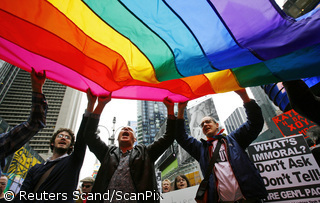Belarus goes to the polls tomorrow, but the President's opponents have a nasty habit of disappearing
Published:
16 October 2004 y., Saturday
He speaks as though the Cold War never ended and makes no effort to conceal his aggressive desire to forge a new Soviet Union. He has in the past praised Hitler's talent for ruling, ridden roughshod over human rights in his country and is suspected of ordering the murders of political opponents who have disappeared without trace. Tomorrow, the President of Belarus, Alexander Lukashenko, aims to win a referendum that would entitle him to tear up the constitution and ensure his continued reign as Europe's last Stalinist dictator.
Mr Lukashenko, his opponents have said, is not merely intent on clearing a constitutional path to run for a limitless number of terms in office, what he wants is a lifetime presidency. The 50-year-old has attempted to deny the allegation, but after a decade of ruling with what he has admitted is "an element of authoritarianism" Mr Lukashenko shows no sign of going quietly.
Belarus, a country of 10 million, is now perched at the frontier of the European Union, bordering Lithuania and Poland. But it has remained hermetically sealed against the democratic and economic forces that have changed the face of many of the former Soviet republics. First-time visitors are struck by how the country seems frozen in a Soviet twilight zone where people still speak in whispers and criticism of the authorities is risky and sometimes life-threatening.
Šaltinis:
news.independent.co.uk
Copying, publishing, announcing any information from the News.lt portal without written permission of News.lt editorial office is prohibited.
The most popular articles
 Tiwonge Chimbalanga and Steven Monjeza are married, but in Malawi homosexuality is banned.
more »
Tiwonge Chimbalanga and Steven Monjeza are married, but in Malawi homosexuality is banned.
more »
 The World Bank today launched the fourth book in the critically acclaimed Moving Out of Poverty series, which provides bottom up perspectives on poverty and local realities by over 60,000 people living in 500 communities in 15 countries.
more »
The World Bank today launched the fourth book in the critically acclaimed Moving Out of Poverty series, which provides bottom up perspectives on poverty and local realities by over 60,000 people living in 500 communities in 15 countries.
more »
 Ten years ago, European leaders pledged to end poverty in the EU by 2010. As this deadline approaches, the goal is still some way off.
more »
Ten years ago, European leaders pledged to end poverty in the EU by 2010. As this deadline approaches, the goal is still some way off.
more »
 For many 2009 will be a historic year with the coming into force of the Lisbon Treaty, the outcome of the Copenhagen summit and the inauguration of the first black US president.
more »
For many 2009 will be a historic year with the coming into force of the Lisbon Treaty, the outcome of the Copenhagen summit and the inauguration of the first black US president.
more »
 Not answering the phone, celebrating Hogmanay and reading Dickens' Christmas Carol are just three seasonal traditions that MEPs shared with us.
more »
Not answering the phone, celebrating Hogmanay and reading Dickens' Christmas Carol are just three seasonal traditions that MEPs shared with us.
more »
 More and more people make their homes and own property in EU countries other than the one in which they hold citizenship.
more »
More and more people make their homes and own property in EU countries other than the one in which they hold citizenship.
more »
 European Parliament President Jerzy Buzek has made an televised Christmas and New Year address to European citizens, looking ahead to the challenges of the coming year.
more »
European Parliament President Jerzy Buzek has made an televised Christmas and New Year address to European citizens, looking ahead to the challenges of the coming year.
more »
 Lithuania takes the 1st position in the EU by the number of students in the country.
more »
Lithuania takes the 1st position in the EU by the number of students in the country.
more »
 Sergei Kovalev, former political prisoner turned activist for Russian human rights group Memorial gave an emotional and heartfelt address to the European Parliament on Wednesday 16 December.
more »
Sergei Kovalev, former political prisoner turned activist for Russian human rights group Memorial gave an emotional and heartfelt address to the European Parliament on Wednesday 16 December.
more »
 Strengthened passenger rights for travel by bus are an important item on the agenda when the Transport, Telecommunications and Energy Council (TTE) meets on 17–18 December.
more »
Strengthened passenger rights for travel by bus are an important item on the agenda when the Transport, Telecommunications and Energy Council (TTE) meets on 17–18 December.
more »